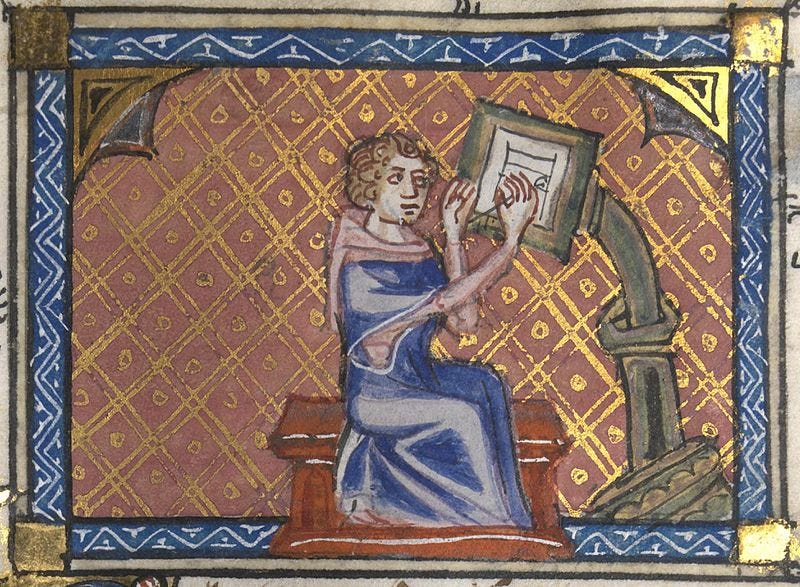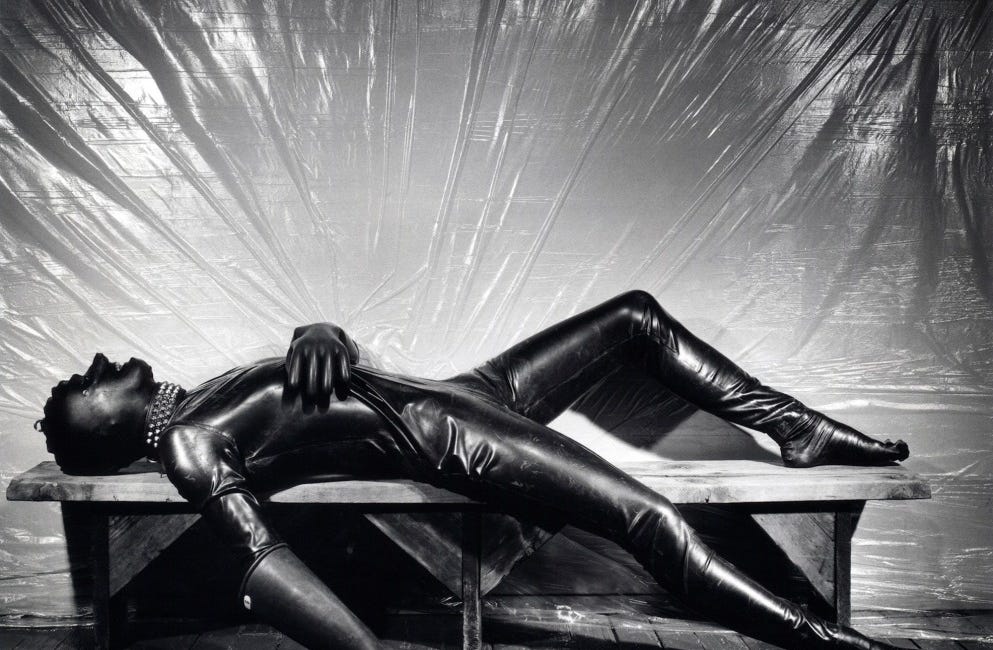Dear Friends,
I started working on a newsletter about passion projects, eternal recurrence, and the enshittification of social media, but it might have transformed into a screed about how I abhor social media and how we should all be evacuating every platform. And, well, by the time I got to that point I did not feel like I was ready to say that with my full chest yet.
So I think I want to try again, while attempting to embrace brevity, and without burying the lede. What I meant to say and failed the first time is that no matter how bad everything gets and no matter how miserable everything feels, we, as creatives and humans, still have to chase our passions and pleasures. And that our primary obligation to ourselves is to nurture the artist, even if that means killing the author.
I’ve been thinking a lot recently about what it means to be a writer, and an author, and an author on the internet. I’ve been thinking a lot about this term called platform decay, which you all probably know more commonly by Cory Doctorow’s funnier neologism from a few years ago: enshittification. The idea is that under capitalism, online services will increasingly prioritize profits for shareholders and deprioritize positive user experience. Platforms initially court users with promises of user privacy, algorithms unimpeded by advertising, user-friendly design, and free services. Once users are locked in, the platform sells out their user base to advertisers. Platforms may introduce paywalls, increase fees, degrade the experience with more ads, or extract more data to sell to buyers—all while reducing service quality. By this point, alternatives may not be readily available, leaving users stuck in a worse ecosystem.
I’m gonna be real with you: I don’t think there’s a lasting ethical choice when it comes to the platforms we use, because buying into the cult of infallibility regarding any single social media platform never ends up aging well (‘buying into the cult of infallibility’ is one of the tenets of fascist ideology, after all). I know Instagram and Facebook and Twitter and Substack platform bad actors. I know they are bad. I’m also skeptical if Ello or Diaspora or Bluesky or Mastodon or Ghost or Beehiiv or Buttondown can permanently keep bad actors at bay, build a sizeable platform that people actually want to use, and resist enshittification in the long term. If nothing else, we’ve earned this distrust. We deserve to be entitled to our skepticism.
I’ve also been doing this for like twenty years. By this I mean being a writer on the internet who shares opinion and creative writing in public spaces—going all the way back to LiveJournal in the early aughts. I don’t think I have the mojo in me anymore to move again. I’m about one social media platform migration away from throwing my laptop into a river and moving out to a tent in the woods and going off the grid completely. We’re talking going back to a Nokia brick phone, if that. And living off mushrooms and berries that I gather in a cute little basket.
Here lies the rub though. There are many unpublished writers, emerging writers, one-or-two-book writers, published-but-oops-still-invisible writers, mid-list writers… who have been told they have to keep a social media presence. This is a message that primarily comes to us from the world of publishing professionals: agents and editors and publicists. What ends up happening is that your self who revels in the joy of creation has to reconcile with the self that lives inside you that has been conscripted to be a businessperson.
So perhaps what I want to say to you is something that I would want someone to say to me: you don’t have to be on social media. You don’t have to be on social media as this authentic you or this hyper-curated author-persona you. You don’t have to have to ‘build an author platform.’ If someone else publishes your book, you certainly shouldn’t bear the burden of being the sole person who feels responsible for its success. If you find no joy in being on Bluesky or Instagram or Tiktok or YouTube—don’t do it. Give yourself that permission. It’s more important to spend your hours creating the art that you want to create over agonizing whether you possess the ability to sell yourself as a public figure to a bunch of strangers in the sea of zeroes and ones.

You may be wondering why I’ve even been thinking about social media platforms, and it’s probably a mixture of two things 1) there’s been discourse cycling again about how Substack is an immoral platform choice, and I have considered deleting mine because of this and 2) something that I wrote last year that was fairly irrelevant has become relevant again.
Eternal recurrence posits that all events across the time-space continuum are destined to repeat themselves endlessly. This past week or so there’s been some discourse about the National Endowment for the Arts, also known as the NEA. If you’re unfamiliar with the NEA’s history, it was part of Lyndon B. Johnson’s series of programs known as “Great Society.” Launched in the 1960s, the Great Society was connected to the civil rights movement, although with a broader aim to reduce poverty and racial discrimination in the United States (as you can see, it was a great success).
Johnson believed the arts were connected to the project of social betterment. This is because Johnson was laser-focused on politics, which resulted in something paradoxical about the formation of the NEA. It reminds me of the oft-discussed formation of the Iowa Writers’ Workshop, which was directed toward fostering American individualism and American exceptionalism over nurturing artists purely for their cultural contributions. At the very least, there is a similarity in the government’s vested interest and interventions in what American artists should create.
In terms of the NEA, most writers are probably most familiar with the agency because they give out free money to poets and prose writers on alternating years. The Creative Writing Fellowships have come under scrutiny recently because beneath an “Assurance of Compliance” clause on arts.gov, there are statements that dictate that NEA grant recipients cannot use the money to operate DEI programs, cannot use the funds to "promote gender ideology," will comply with all Executive Orders while the award is administered, and will comply "in all respects with all applicable anti-discrimination laws."
The “eternal recurrence” here is that this isn’t the first time that conservatives have used the NEA to try and dictate exactly how U.S. artists can or cannot use funds. There was a whole epoch of attempts to censor art (not to mention abolish the NEA itself) in the 1980s and 1990s. In fact… I wrote an entire newsletter on the subject in May of last year!:
While this isn’t necessarily the time-is-a-flat-circle topic I’d hope to be ahead of the curve on, I did feel this strange sense of… pride?—self-respect?—that I’d written about something I’d cared about, and suddenly it became topical again.
Sometimes I wonder how my newsletter would be different if I was chasing down and commentating on current events in the realms of creative writing and publishing like some of my peers do. Would I have more subscribers? When I promote my newsletters after publishing them, would they gain more traction on social media? Would I have the type of ‘author platform’ that I have been told I am supposed to have, instead of an odd assortment of letters based on whatever shiny, miscellaneous thing has caught my eye any given week?
I can’t tell you whether you should start a newsletter, or spend twelve hours a day tweeting, or whether you should post videos of yourself reviewing books. I write here because everything I mull over feels genuinely interesting to me in the moment (my apologies if it isn’t interesting to you, lol). I write because I want to stand behind my own words.
And while I can’t tell you how to build a successful ‘author platform’ for yourself, I will tell you again and again to create something you care about. Even if it feels like only five other people care. Even if it feels like no one else cares. Because often it feels like no one else cares. So many of us are rendered invisible by these capitalist impulses we’ve internalized, these barometers for success. And who knows. Maybe today’s niche obsession will be relevant in the future. Maybe it will never be relevant, but at least you threw your ass forward into something you cared about. Something that moved you, even if ever-so-briefly.
Enshittification isn’t something just confined to the internet either, is it? We’re living at the end of an era of capitalism where we’ve been completely sold out. We’re familiar with the narratives. Eggs are expensive. Healthcare doesn’t exist. There is a lot of displeasure. It’s around us, always, as many of us try to survive in our own ways. There is a lot that feels bad, and the one thing that should not feel bad is creating the art that your mind and heart pushes you toward.
So please. For me. For yourself. Create something you care about. Moderate your bandwidth. Moderate your impulse to respond to everything. Temper your resistance to the cultural obsession with everything current and new. Indulge in your obsessions, no matter how niche. Indulge your magpie self: collect only the shiniest things you love.
Like platforms, everything will continue to decay. When the world around us is decomposing, it is the artist’s role to find a seed hidden inside the rot, to locate something to grow again.
Until next time,
JD





Thank you. Really needed to hear this. Just starting out, not published or anything, don’t really want to do it like everyone else (seems fucking exhausting and joyless) and just want to be like you: indulging my many unrelated enthusiasms that make me happy. Happy is key. Maybe happy gets you to someplace that’s yours, whatever the outcome.
Well said. Thank you for the reminders, so relevant today (and perhaps, always.)